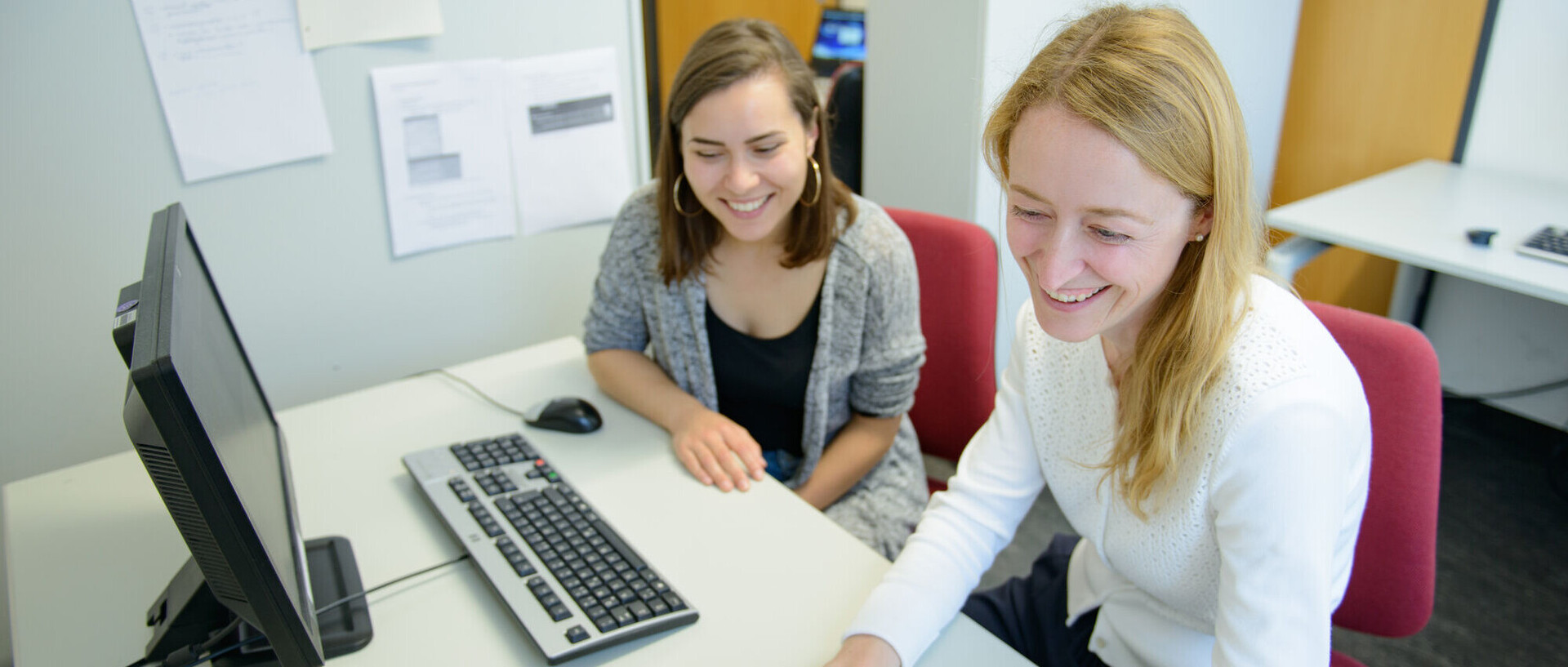Empirical Social Research (MZES)
Empirical social research is the systematic collection and interpretation of data on social phenomena and contexts. Empirical social research has a strong tradition at the University of Mannheim. Empirical social research is often interdisciplinary, international and comparative and is characteristic of the university's profile.
Several disciplines, in particular Political Science, Sociology and Psychology, draw heavily on the approaches and methods of empirical social research and develop these further for research and teaching.
At the University of Mannheim, empirical social research is primarily carried out at the Mannheim Centre for European Social Research (MZES). Today, the center is the largest social science research institute at a German university. For decades, it has been very successful in acquiring the funding necessary for excellent research, for example from the German Research Foundation (DFG) and several grants from the European Research Council (ERC).
PARFORM – Partnership formation in the context of recent refugee migration (ERC Consolidator Grant)
In her research project, for which she received an ERC grant, Irena Kogan examines how male refugees who have recently immigrated to Germany find partners. Her research focuses on male refugees from Syria and Afghanistan aged between 18 and 30 years. In December 2019, the sociologist from Mannheim received an ERC Consolidator Grant for the project worth almost two million euros for a period of five years.
The project was developed from an ongoing long-term study the sociologist is involved in, which is conducted in Mannheim and funded by the German Research Foundation (DFG). This study examines the life course and integration processes of young people with and without a migrant background.
more information
 Credit: Michael Holstein
Credit: Michael HolsteinProf. Dr. Irena Kogan
Professorship of Sociology, Societal ComparisonsUniversity of Mannheim
School of Social Sciences
A 5, 6 – Room A 529
68159 MannheimConsultation hour(s):
Tue 2–3 p.m.“The Big Two”: Agency and Communion (ERC Consolidator Grant)
In 2019, Professor Dr. Jochen E. Gebauer received a Consolidator Grant of the European Research Council (ERC) in the amount of 2 million euros. n Höhe von rund 2 Millionen Euro. He explores the question of what evolutionary advantage humans gain from performing an evaluation of themselves and others primarily on the basis of agency and communion, the “Big Two.”
In this project, Jochen Gebauer analyzes why people assess themselves and others primarily on the two personality trait dimensions of agency and communion. As part of an international and interdisciplinary team, the researchers are using long-term surveys and laboratory experiments to focus primarily on the evolutionary advantage that such an assessment could bring.
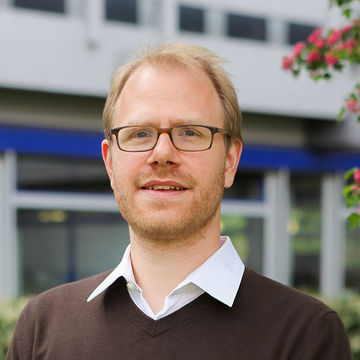 Credit: Elisa Berdica
Credit: Elisa BerdicaProf. Dr. Jochen E. Gebauer
Professor for Cross-Cultural Social and Personality PsychologyUniversity of Mannheim
School of Social Sciences
Cross-Cultural Social and Personality Psychology
A 5, 6
Building A – Room A 435
68159 MannheimPartisanship and Support among Sexual and Gender Minorities (ERC Starting Grant)
Political scientist Dr Constantin Wurthmann received an ERC Starting Grant worth 1.5 million euros in 2025. In his project, he is investigating how the identities of sexual and gender minorities develop and how these identities influence political attitudes and party preferences. Despite growing social relevance, there is currently little systematic data on the political orientation of LGBTQ* individuals. Wurthmann's project closes this research gap.
Dr. Constantin Wurthmann
Mannheim Centre for European Social Research (MZES)
University of MannheimE-Mail: constantin.wurthmannuni-mannheim.de
Phone: +49 621 181-2881Election research for the 2025 federal election
The research project, led by Professor Thomas Gschwend, developed a method within the framework of election research for the 2025 federal election, which was divided into three subprojects:
- The development of new methods has advanced the dynamic scientific prediction of elections in multi-party systems.
- The project collected data to be used for forecasting at local and national level and for analyzing the consequences of election predictions.
- Observational and experimental data are used to generate insights into the effects of election predictions on the attitudes and behavior of citizens and elites.
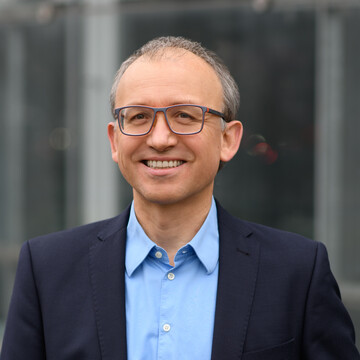 Credit: Anna Logue
Credit: Anna LogueProf. Thomas Gschwend, Ph.D.
Chair of Political Science, Quantitative Methods in the Social SciencesUniversity of Mannheim
School of Social Sciences
A5
Building B – Room B 220
68159 MannheimConsultation hour(s):
Tue 13:30–14:30German Center for Integration and Migration Research (DeZIM)
The German Center for Integration and Migration Research (DeZIM) was founded in July 2017 under the leadership of the Federal Ministry for Family Affairs, Senior Citizens, Women and Youth (BMFSFJ). It aims to strengthen, network and further develop existing structures in migration and integration research in the long term, address central issues of migration and integration and close gaps in research. Frank Kalter, a sociologist from Mannheim, has been appointed to the dual leadership of DeZIM by the BMFSFJ.
The following research projects are currently underway as part of the DeZIM research community in Mannheim:
- Social conflicts and dynamics of party competition in migration and integration policy
- Research networking in the DeZIM network
- Ethnic and socio-economic background of applicants for political office: Implications for patterns of representation in the post-migrant society
- Democratic values among migrants from authoritarian regimes
 Credit: DeZIM-Institut (Fotograf: Rasmus Tanck)
Credit: DeZIM-Institut (Fotograf: Rasmus Tanck)Prof. Dr. Frank Kalter
Professor of General SociologyUniversity of Mannheim
School of Social Sciences
A 5, 6
Building A – Room A 449
68159 MannheimConsultation hour(s):
by appointmentConflict and human rights research
The research of Professor Sabine C. Carey, PhD and her team focuses on the empirical analysis of various aspects of violent conflict, human rights violations, and the suppression of insurgencies. A particular focus is on the role of actors such as pro-government militias and the connection between government violence and repression.
Government militias
In one of her projects, Professor Carey is researching the characteristics and causes of government militias as well as the consequences of their activities. Government militias are armed groups with links to the government, for example in countries affected by civil war such as Syria, Libya or Algeria – but also outside war zones. They often receive weapons and training from the government, but are outside the regular security institutions. The academic work is based on the Pro-Government Militias Database (PGMD), which records around 350 of these militias worldwide between 1981 and 2014. The database is currently being expanded and will in future cover the years up to 2020. An online guidebook presents the most important information.
Professor Carey's research project was supported by an ERC Starting Grant until the end of 2019.How can support for human rights be strengthened in times of crisis?
A current project is investigating whether and under what conditions support for human rights can be strengthened in times of crisis. To this end, Carey and her team are conducting a series of innovative survey experiments with adults in Germany. The aim is to evaluate theoretically and empirically whether emphasizing the importance of human rights increases public support. It also examines how the characteristics of the rights holders and the attitudes of the respondents towards human rights influence the impact of various arguments in crisis situations.
The project is funded by the German Research Foundation (DFG) for a period of four years until the end of 2026.
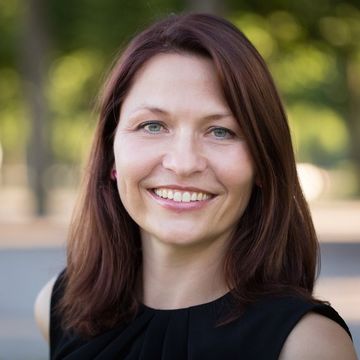 Credit: Elfengraphie
Credit: ElfengraphieProf. Sabine C. Carey, Ph.D.
Professorship of Political Science, International RelationsUniversity of Mannheim
School of Social Sciences
A 5, 6 – Room B 120
68159 MannheimSocial structure in transition
As part of the “Reconfiguration and Internalization of Social Structure” (RISS) research group, Professor Dr. Richard Traunmüller and his team are investigating the effects of social change on people's social and political orientation. The Mannheim researchers are examining the phenomenon of sociocultural change from a higher-level perspective: simulation studies and meta-analyses provide them with multidimensional insights into sociostructural change and individuals' social identification with society as a whole and with social subgroups.
The RISS research project is a collaboration between the University of Mannheim and Johannes Gutenberg University in Mainz and is funded by the DFG with three million euros.
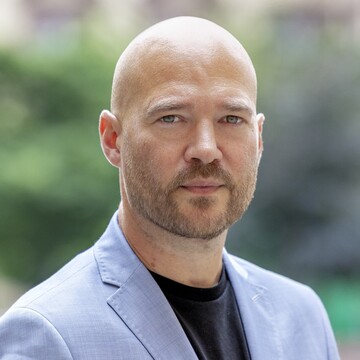 Credit: Alexander Münch
Credit: Alexander MünchProf. Dr. Richard Traunmüller
Professorship of Political Science, Empirical and Democracy ResearchUniversity of Mannheim
School of Social Sciences
A 5, 6
Building A – Room 332 – Room 332
68159 MannheimConsultation hour(s):
Wed. 10:30–11.30
Appointments: kirsten.jonasson-vreeuni-mannheim.de
